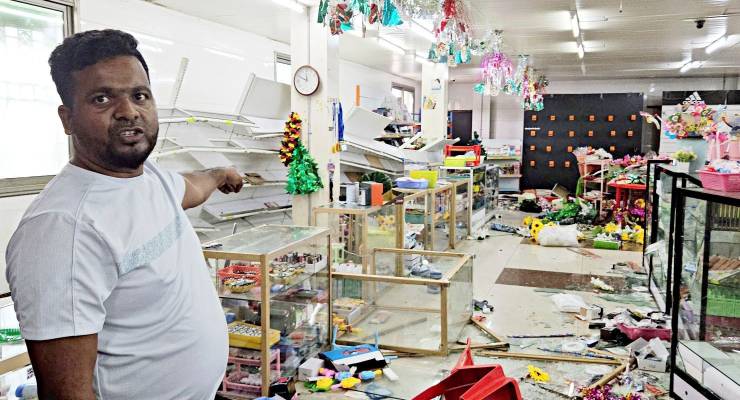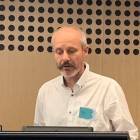
The world has been shocked by images of wanton violence, looting and destruction on the streets of Papua New Guinea’s capital, Port Moresby, in the past week.
Prime Minister James Marape declared a state of emergency as shops were set on fire and citizens shot. At least 22 people have been killed as a result of the violence.
Several reasons have been put forward for the sudden eruption of violence. A “technical glitch” in the government’s payroll system that cut public service pay packets was the official explanation, although this did little to quell rumours that the cut was due to a sudden tax increase.
Marape blamed political interference for spreading the rumours. The opposition blamed Marape for mismanagement. Whatever the reason, public servants, crucially including the beleaguered police force, promptly went on strike and abandoned their posts, leading to the violence and looting.
Whether Marape’s or the political opposition’s explanation is plausible is perhaps less important than trying to understand the underlying causes of such apparently spontaneous violence. We believe the roots lie in the rapid and uncontrolled growth of Port Moresby (and of other major urban centres such as Lae) that began before Papua New Guinea’s independence in 1975, when it was an Australian territory.
This growth has produced a swollen population that can quickly transform into an angry, riotous mob, especially when the instruments of civil control such as the police are withdrawn.
Now home to more than 400,000 people, Port Moresby owes its origins to the first European colonisers who settled there in the late 19th century. Prior to European contact, a total of about 2,000 Motu and Koita villagers lived in the Port Moresby area. By the end of World War II, about 5,000 Indigenous people were there (and around 1,500 Europeans).
In the post-war years, there was a continuous and rapid increase in the Melanesian population. This was spurred primarily by increased Australian government spending and the accompanying need for labour.
By 1954, the Indigenous population of Port Moresby had expanded to 12,000. By 1966, it was 32,000. At the time of independence in 1975, the Indigenous population was 95,000.
Lack of land for housing was the main challenge for Indigenous people relocating to Port Moresby for employment. Unlike in Australia, most land in PNG has never been alienated and is customarily owned. Much of Port Moresby is still owned by its original Motu and Koita inhabitants.
The influx of internal migrants meant many people had little choice other than to squat on others’ land. As a result, during the post-war decades “temporary shanty towns, built from industrial scrap, the relics of war, packing cases and the like” grew up, as Charles Rowley wrote in the 1960s.
In the following decade, Australian economist Ross Garnaut noted that services and planning had failed to keep up with the influx.
Despite repeated attempts to address this problem, it has never been satisfactorily resolved. As recently as October 2023, Port Moresby Governor Powes Parkop has pressed for squatters to be given title to their land.
In 2021, it was estimated nearly 50% of Port Moresby’s residents lived in informal settlements.
The traditional landowners, furious at what they regard as losing their land to “greed”, regularly demand the removal of the squatters. Evictions are frequent.
Further exacerbating the sense of hopelessness and precarity has been the chronic unemployment experienced by residents of the settlements, particularly the young. Nearly 90% of Papua New Guineans earn less than A$10.40 per day. Faced with the day-to-day challenges of making ends meet, many see the huge gulf between rich and poor as rubbing salt into their wounds.
Luxury gated communities tucked behind high fences with private security guards are visible reminders of the wealth gap. It could be understood if the recent violence had been directed at these properties instead of at the more accessible, but perhaps less deserving, local trade stores. As is all too often the case with this kind of unrest, people will vent their rage wherever and whenever the opportunity arises.
The crisis in Port Moresby has many causes, including the disparity in wealth, high unemployment and living conditions equal to some of the worst places in the world. We also know most of its residents are as shocked and appalled by the violence as we are.
We believe an understanding of the past will help to illuminate and explain the present, and that understanding the roots of the current crisis may help to prevent such events from happening in the future.
This story first appeared in The Conversation.









Given the endemic corruption of government in PNG and the long history of government funds disappearing (at least from there intended use) many public servants are likely to have interpreted the proportion of their wages disappearing as another even more blatant theft of government money. There have been regular instances of failure to pay wages in full and on time in the past – though never one public service wide. Even the police at one stage were not paid – leading to a lot of ‘on the spot’ fines as they kept themselves financial.
As always with these riots the Chinese owned shops get hit the hardest due to the local resentment at the extent of Chinese ownership and prejudices against the shopkeepers approach to doing business.
And yes, I have worked in PNG in recent times and even been ‘on the spotted’ because any foreigner clearly has money.
And another comment highlighting the racial element with the riots. No wonder the PRC wants to work with PNG and Solomon Islands Police.
So, does that mean today’s Motu and Koita are doing quite well out of the situation?
Watching SBS News, I saw three shop owner victims being interviewed. One was a Melanesian woman and the other two were ethnic South Asians – with I think Muslim names.
In Madagascar, when people rioted in the late 1980s, they targeted Chinese shops. In riots in Honiara, from memory it was Chinese shops that were targeted, one of the reasons China offered training for the Solomon Islands Police.
So I’m wondering if there was a racial element to the Port Moresby riots – attack the outsiders with lots of money who therefore must have been ripping us off.
Not necessarily racial – just attacking the group that gets your money and seems better off.
There’s always an element of both inter-tribal and intra-tribal rivalry. Jealousy is a big thing.
I wish we could find out more about the political interference Marape is talking about. Vaguely alludes to foreign actors. This smells similar to what happened in the Solomon Islands several years ago. USAID gave Malaita Province 20 million dollars directly and bypassing the central government. Malita Province is generally hostile to the central government and China in general. Soon after Malaita received the money, hundreds of Malaitans sailed over to Honiara to riot and proceeded to destroy all the Chinese businesses. I would not rule out foreign interference as an enabler for these PNG riots.
Not sure if the Russians (mining) or Malaysians (logging) stand to gain any benefit from the riots and chaos. If anything it pushes up their own security costs and the enmity towards these foreigners always lurks not too deeply.
I’d say most foreigners who didn’t already have a bug out contract with any of the heli-services would now be in talks with aviation contractors.
Given the Solomon Islands government treats the Treasury as a personal ATM for politicians – the source of considerable conflict with Australia – giving money to it is not an effective way to reach people . This is especially the case for Malaita as the Solomon’s government is currently dominated by Guadalcanal interests.
This refers to only one of so many situations, incidents, wrongs, which illustrate the overbearng power of neoliberal conservative controlling, profiteering, rigging, selfish overbearing organisation, whereby the order givers and controllers are always in a dominant position, attracting flows and benefits, and the masses of set wage and income people are constatly robbed, injured, outflanked, set back, in all financial “moves.”